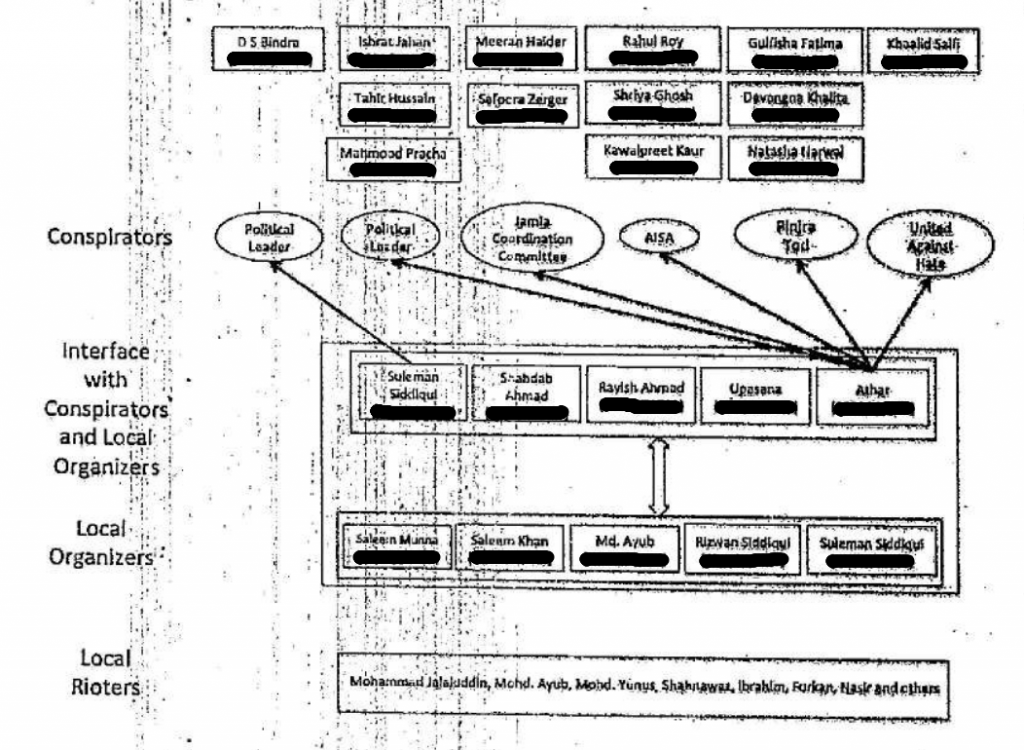The communal riots that erupted in North East between 23 February to 29 February which had claimed the lives of 53 people and crores worth of destruction of properties, Delhi police and Right wingers are trying to push forward an Idea that violence was a result of a “deep-rooted conspiracy” by activists who had been peacefully protesting against the controversial Citizenship (Amendment) Act (CAA), the proposed National Register of Indian Citizens (NRC), and the National Population Register (NPR).
In these last few months, we have seen several anti CAA activists and students being arrested, many under the stringent charges of UAPA for allegedly planning and executing the riots. Although the Delhi police seem reluctant to pursue any investigation over the alleged involvement of Bhartiya Janta Party leaders, Anurag Thakur and Kapil Mishra, despite being on tapes, instigating communal tensions through their inflammatory comments and hate speeches.
An analysis of the nature of riot cases and charge sheets filed against multiple accused persons indicates the Delhi police’s investigation is tainted by selectivity. Many media reports have also shown that several riot charge sheets filed by the police contain little or no evidence about the actual collusion of the arrested persons in the riots.
Scrutiny of recent charge sheets, FIRs and summons suggest the police has begun to deliberately target members 0f a WhatsApp group called Delhi Protests Support Group (DPSG), created on December 28, 2019, by cultural and political activists who were vehemently opposed to the CAA, and been resolved to support the spontaneous pan-India community protests against the Act and NRC. Already, some members of the group have been arrested and charged with stringent laws like the Unlawful Activities (Prevention) Act (UAPA).
The group had more than 100 members, among them were prominent personalities like political activists Kavita Krishnan, Annie Raja, and Yogendra Yadav, and social activists Harsh Mander, Gautam Mody, N.D. Jayaprakash, Apoorvanand, Anjali Bhardwaj, Nadeem Khan, and filmmakers Rahul Roy and Saba Dewan and many others. Pinjra Tod founding member Natasha Narwal, former JNU student Umar Khalid and United Against Hate activist Khalid Saifi, all of whom have been booked on UAPA charges, were also members. Umar Khalid has not so far been arrested.

 Police disclosure of Shadab Ahmed’s Statement
Police disclosure of Shadab Ahmed’s StatementThe documents produced in the court by the Delhi police place the DSPG at the centre of the probe and buttress their claim that the riots were a “deep-rooted conspiracy” by highlighting specific discussions from the chat. Shadab Ahmad is one of the anti- CAA activist, and was arrested by Delhi police following the riot, his statement was presented at the court and the overall thrust of his statement is that many of the DSPG activists wanted to destabilize the Narendra Modi government through the protests, especially when US President Donald Trump was visiting India, and that they held confidential meetings and created “secret codes” to plan their unrest.
Police disclosure of Shadab Ahmed statement similarly, the Delhi Police’s focus on DPSG comes is highlighted through a flowchart in the charge sheet filed on the killing of constable Ratan Lal’s on the first day of the riots. The flowchart seeks to establish a relationship between the alleged rioters and many leading civil society activists, including some DPSG members, who are termed as “conspirators”. Flowchart accusing DSPG member as conspirators filed in the charges sheet on Rats killing of constable Ratan Lal’s killing
Flowchart accusing DSPG member as conspirators filed in the charges sheet on Rats killing of constable Ratan Lal’s killing
What was the DPSG?
The group was formed after a December 26, 2019 meeting of prominent activists – all of whom have distinguished records as advocates of Indian secularism and social justice – the group remained active for a little more than two months. Over this period, it became a virtual meeting point for activists of varied political tones to discuss the nature of their support to the anti-CAA protests, while also acting as an information platform and resource group. Before creating the group, all members of the agreed that it would not be a coordinating body between different protests, which were spontaneously being led by communities across India, but would constrain itself only with sharing information and supporting sites by identifying speakers and artists”.
Like most advocacy groups, members of DSPG are also discussing the best possible ways in which the protests could be more impacting. While sometimes these differences of the ideas would transform into heated arguments, eventually being resolved democratically.
Delhi Police has been trying to advance its “conspiracy” theory on one such difference of opinion, where Pinjra Tod activists attempt to mobilize anti-CAA women activists to block roads as a measure of protest.
The full transcript of the chat has been obtained by the “The Wire” and they have revealed certain discussion that took place at the in those chats. And those discussions were certainly in no way trying to incite violence. It had members with differing opinions who were united by their faith in constitutional nationalism, non-violence, and a multi-faith democracy. Similarly, all of the participants of the group were anti-fascist and critical of majoritarian governments across the world.
Read more here; https://thesecondangle.com/arrests-made-after-delhi-riots-in-february-were-bigoted-in-nature-admits-delhi-police/
[zombify_post]




